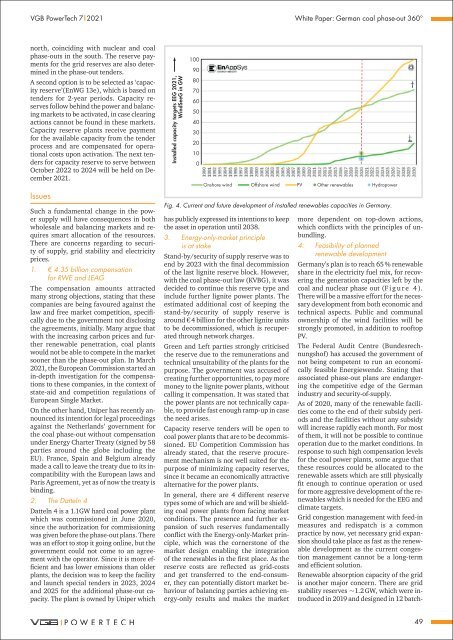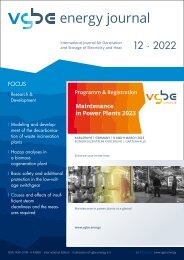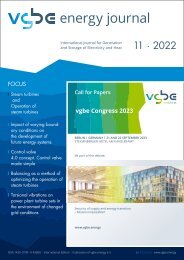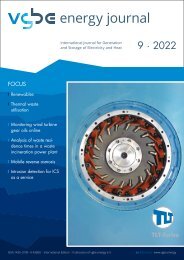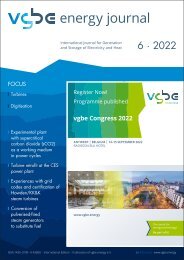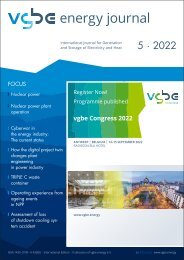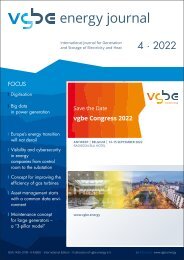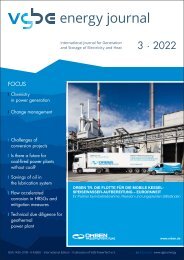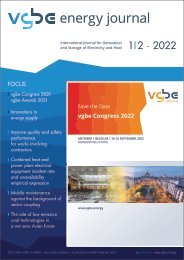VGB POWERTECH 7 (2021) - International Journal for Generation and Storage of Electricity and Heat
VGB PowerTech - International Journal for Generation and Storage of Electricity and Heat. Issue 7 (2021). Technical Journal of the VGB PowerTech Association. Energy is us! Optimisation of power plants. Thermal waste utilisation.
VGB PowerTech - International Journal for Generation and Storage of Electricity and Heat. Issue 7 (2021).
Technical Journal of the VGB PowerTech Association. Energy is us!
Optimisation of power plants. Thermal waste utilisation.
- No tags were found...
Create successful ePaper yourself
Turn your PDF publications into a flip-book with our unique Google optimized e-Paper software.
<strong>VGB</strong> PowerTech 7 l <strong>2021</strong> White Paper: German coal phase-out 360°<br />
north, coinciding with nuclear <strong>and</strong> coal<br />
phase-outs in the south. The reserve payments<br />
<strong>for</strong> the grid reserves are also determined<br />
in the phase-out tenders.<br />
A second option is to be selected as ‘capacity<br />
reserve’(EnWG 13e), which is based on<br />
tenders <strong>for</strong> 2-year periods. Capacity reserves<br />
follow behind the power <strong>and</strong> balancing<br />
markets to be activated, in case clearing<br />
actions cannot be found in these markets.<br />
Capacity reserve plants receive payment<br />
<strong>for</strong> the available capacity from the tender<br />
process <strong>and</strong> are compensated <strong>for</strong> operational<br />
costs upon activation. The next tenders<br />
<strong>for</strong> capacity reserve to serve between<br />
October 2022 to 2024 will be held on December<br />
<strong>2021</strong>.<br />
Issues<br />
Such a fundamental change in the power<br />
supply will have consequences in both<br />
wholesale <strong>and</strong> balancing markets <strong>and</strong> requires<br />
smart allocation <strong>of</strong> the resources.<br />
There are concerns regarding to security<br />
<strong>of</strong> supply, grid stability <strong>and</strong> electricity<br />
prices.<br />
1. € 4.35 billion compensation<br />
<strong>for</strong> RWE <strong>and</strong> LEAG<br />
The compensation amounts attracted<br />
many strong objections, stating that these<br />
companies are being favoured against the<br />
law <strong>and</strong> free market competition, specifically<br />
due to the government not disclosing<br />
the agreements, initially. Many argue that<br />
with the increasing carbon prices <strong>and</strong> further<br />
renewable penetration, coal plants<br />
would not be able to compete in the market<br />
sooner than the phase-out plan. In March<br />
<strong>2021</strong>, the European Commission started an<br />
in-depth investigation <strong>for</strong> the compensations<br />
to these companies, in the context <strong>of</strong><br />
state-aid <strong>and</strong> competition regulations <strong>of</strong><br />
European Single Market.<br />
On the other h<strong>and</strong>, Uniper has recently announced<br />
its intention <strong>for</strong> legal proceedings<br />
against the Netherl<strong>and</strong>s’ government <strong>for</strong><br />
the coal phase-out without compensation<br />
under Energy Charter Treaty (signed by 58<br />
parties around the globe including the<br />
EU). France, Spain <strong>and</strong> Belgium already<br />
made a call to leave the treaty due to its incompatibility<br />
with the European laws <strong>and</strong><br />
Paris Agreement, yet as <strong>of</strong> now the treaty is<br />
binding.<br />
2. The Datteln 4<br />
Datteln 4 is a 1.1GW hard coal power plant<br />
which was commissioned in June 2020,<br />
since the authorization <strong>for</strong> commissioning<br />
was given be<strong>for</strong>e the phase-out plans. There<br />
was an ef<strong>for</strong>t to stop it going online, but the<br />
government could not come to an agreement<br />
with the operator. Since it is more efficient<br />
<strong>and</strong> has lower emissions than older<br />
plants, the decision was to keep the facility<br />
<strong>and</strong> launch special tenders in 2023, 2024<br />
<strong>and</strong> 2025 <strong>for</strong> the additional phase-out capacity.<br />
The plant is owned by Uniper which<br />
Installed capacity targets EEG <strong>2021</strong>,<br />
WindSeeG in GW<br />
100<br />
90<br />
80<br />
70<br />
60<br />
50<br />
40<br />
30<br />
20<br />
10<br />
0<br />
Onshore wind Offshore wind PV Other renewables Hydropower<br />
Fig. 4. Current <strong>and</strong> future development <strong>of</strong> installed renewables capacities in Germany.<br />
has publicly expressed its intentions to keep<br />
the asset in operation until 2038.<br />
3. Energy-only-market principle<br />
is at stake<br />
St<strong>and</strong>-by/security <strong>of</strong> supply reserve was to<br />
end by 2023 with the final decommission<br />
<strong>of</strong> the last lignite reserve block. However,<br />
with the coal phase-out law (KVBG), it was<br />
decided to continue this reserve type <strong>and</strong><br />
include further lignite power plants. The<br />
estimated additional cost <strong>of</strong> keeping the<br />
st<strong>and</strong>-by/security <strong>of</strong> supply reserve is<br />
around € 4 billion <strong>for</strong> the other lignite units<br />
to be decommissioned, which is recuperated<br />
through network charges.<br />
Green <strong>and</strong> Left parties strongly criticised<br />
the reserve due to the remunerations <strong>and</strong><br />
technical unsuitability <strong>of</strong> the plants <strong>for</strong> the<br />
purpose. The government was accused <strong>of</strong><br />
creating further opportunities, to pay more<br />
money to the lignite power plants, without<br />
calling it compensation. It was stated that<br />
the power plants are not technically capable,<br />
to provide fast enough ramp-up in case<br />
the need arises.<br />
Capacity reserve tenders will be open to<br />
coal power plants that are to be decommissioned.<br />
EU Competition Commission has<br />
already stated, that the reserve procurement<br />
mechanism is not well suited <strong>for</strong> the<br />
purpose <strong>of</strong> minimizing capacity reserves,<br />
since it became an economically attractive<br />
alternative <strong>for</strong> the power plants.<br />
In general, there are 4 different reserve<br />
types some <strong>of</strong> which are <strong>and</strong> will be shielding<br />
coal power plants from facing market<br />
conditions. The presence <strong>and</strong> further expansion<br />
<strong>of</strong> such reserves fundamentally<br />
conflict with the Energy-only-Market principle,<br />
which was the cornerstone <strong>of</strong> the<br />
market design enabling the integration<br />
<strong>of</strong> the renewables in the first place. As the<br />
reserve costs are reflected as grid-costs<br />
<strong>and</strong> get transferred to the end-consumer,<br />
they can potentially distort market behaviour<br />
<strong>of</strong> balancing parties achieving energy-only<br />
results <strong>and</strong> makes the market<br />
more dependent on top-down actions,<br />
which conflicts with the principles <strong>of</strong> unbundling.<br />
4. Feasibility <strong>of</strong> planned<br />
renewable development<br />
Germany’s plan is to reach 65 % renewable<br />
share in the electricity fuel mix, <strong>for</strong> recovering<br />
the generation capacities left by the<br />
coal <strong>and</strong> nuclear phase out (F i g u r e 4 ).<br />
There will be a massive ef<strong>for</strong>t <strong>for</strong> the necessary<br />
development from both economic <strong>and</strong><br />
technical aspects. Public <strong>and</strong> communal<br />
ownership <strong>of</strong> the wind facilities will be<br />
strongly promoted, in addition to ro<strong>of</strong>top<br />
PV.<br />
The Federal Audit Centre (Bundesrechnungsh<strong>of</strong>)<br />
has accused the government <strong>of</strong><br />
not being competent to run an economically<br />
feasible Energiewende. Stating that<br />
associated phase-out plans are endangering<br />
the competitive edge <strong>of</strong> the German<br />
industry <strong>and</strong> security-<strong>of</strong>-supply.<br />
As <strong>of</strong> 2020, many <strong>of</strong> the renewable facilities<br />
come to the end <strong>of</strong> their subsidy periods<br />
<strong>and</strong> the facilities without any subsidy<br />
will increase rapidly each month. For most<br />
<strong>of</strong> them, it will not be possible to continue<br />
operation due to the market conditions. In<br />
response to such high compensation levels<br />
<strong>for</strong> the coal power plants, some argue that<br />
these resources could be allocated to the<br />
renewable assets which are still physically<br />
fit enough to continue operation or used<br />
<strong>for</strong> more aggressive development <strong>of</strong> the renewables<br />
which is needed <strong>for</strong> the EEG <strong>and</strong><br />
climate targets.<br />
Grid congestion management with feed-in<br />
measures <strong>and</strong> redispatch is a common<br />
practice by now, yet necessary grid expansion<br />
should take place as fast as the renewable<br />
development as the current congestion<br />
management cannot be a long-term<br />
<strong>and</strong> efficient solution.<br />
Renewable absorption capacity <strong>of</strong> the grid<br />
is another major concern. There are grid<br />
stability reserves ~1.2 GW, which were introduced<br />
in 2019 <strong>and</strong> designed in 12 batch-<br />
49


